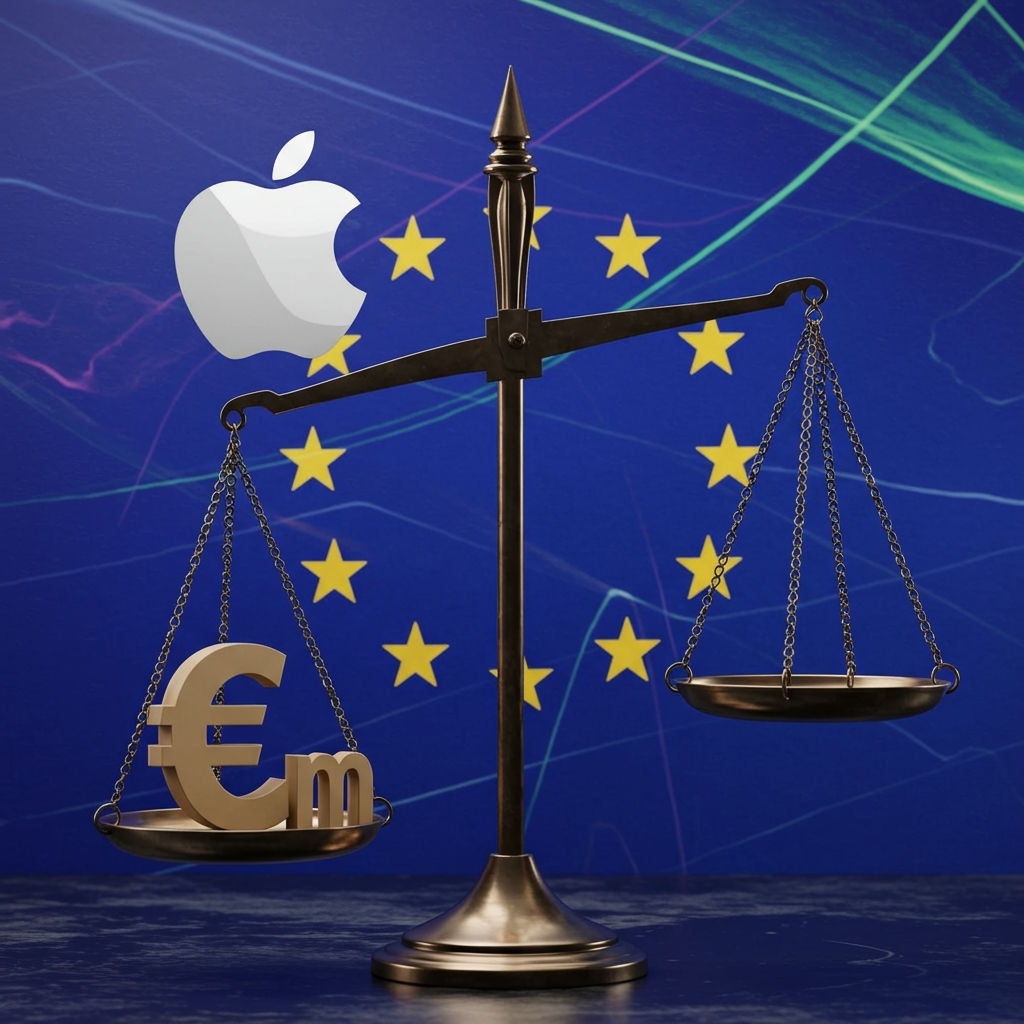apple is challenging a massive €500 million ($580 million) fine from the European Union, intensifying a global regulatory battle over its powerful App Store. The tech giant officially filed its appeal against the penalty, which the EU levied after finding Apple violated competition rules under the landmark digital Markets Act (DMA). This unprecedented fine targets Apple’s restrictions on app developers, specifically preventing them from directing users to cheaper purchasing options outside the App Store ecosystem. The dispute highlights the ongoing tension between major US technology companies and European regulators seeking to curb their market dominance and foster greater digital competition.
Why the EU Fined Apple Under the DMA
In April, the European Commission, the EU’s executive body responsible for enforcing bloc laws, hit Apple with the significant fine. The core issue stemmed from Apple’s long-standing policies that limited how app developers could communicate with users about offers available elsewhere. Specifically, the Commission determined that Apple was blocking developers from “steering” customers towards alternative websites or payment methods beyond Apple’s own in-app purchase system. This practice, the EU argued, stifled competition and limited consumer choice, a direct violation of the newly enacted Digital Markets Act. The DMA aims to create a fairer digital marketplace by imposing strict obligations on large online platforms designated as “gatekeepers,” a group that includes Apple’s App Store. Non-compliance with DMA rules carries severe penalties, potentially reaching up to 10% of a company’s annual global turnover.
Apple’s Defense and Appeal Arguments
Apple is not taking the fine lying down. The iPhone maker has launched a formal appeal with the General Court, the EU’s second-highest court. Apple contends the European Commission’s decision, including the hefty fine, “go far beyond what the law requires.” In its appeal, Apple plans to argue that the Commission is overstepping its authority by attempting to dictate how Apple runs its App Store. The company claims the mandated changes force the implementation of “confusing business terms” that are detrimental to both developers and users.
A central point of Apple’s argument is the Commission’s interpretation of “steering.” Apple accuses Brussels of unlawfully broadening this definition. Initially, the focus was arguably on whether developers could link to external websites. Apple claims the Commission has now expanded this to include whether developers can promote offers inside their apps, arguing this moves the “goal posts” and forces them to “give away our technology for free.” Apple feels unfairly targeted and believes the facts presented to the court will support its position.
Navigating Compliance: New Rules and Fees
To avoid the threat of much larger daily fines – which could amount to approximately €50 million per day, based on 5% of its average daily worldwide revenue – Apple had already made significant changes to its App Store rules for the EU market in late June. These revisions aimed to comply with the EU’s order to remove technical and commercial restrictions on developers. Under the updated rules, developers distributing apps in the EU are now technically allowed to link freely to external deals and offer alternative purchase methods that bypass Apple’s in-app purchase system.
However, these new “freedoms” come with a controversial new fee structure specifically for EU developers, set to take full effect by January 1, 2026. This complex, multi-layered system includes a Core Technology Commission (CTC), an initial acquisition fee, and a store services fee. The fees vary based on a tiered system, where developers pay more for using a fuller suite of Apple’s App Store services. Apple claims this complexity, including separating core features like search and browse suggestions into optional tiers, was mandated by the European Commission requiring them to offer different service levels allowing developers to pay less. Critics, however, argue the complexity and cost might still effectively discourage developers from using external payment options, potentially preserving Apple’s business advantage despite the regulatory pressure.
Broader Regulatory Context and Expert Views
The clash between Apple and the EU is part of a much larger pattern of increased regulatory scrutiny faced by dominant US tech firms in Europe and globally. Figures like former US trade adviser Peter Navarro have even accused the EU of using “lawfare” and “non-tariff weapons” against American companies like Apple and Meta. While a European Commission Vice-President has stated the EU won’t compromise its tech rules for trade deals, other US tech leaders, such as Meta CEO Mark Zuckerberg, have previously criticized EU digital regulations, calling them “institutionalising censorship.”
Competition lawyers view Apple’s appeal as predictable. Tom Smith, a competition lawyer at Geradin Partners, suggests Apple “fundamentally hates” attempts to alter its App Store model. He posits that spending millions on legal fees is strategically worthwhile for Apple, as it can disrupt and delay the development of a more open app ecosystem – a market worth billions annually to the company. Tech analyst Paolo Pescatore echoed that the appeal was “widely expected” but regrettable, as it forces the issue into a potentially lengthy court process. He emphasized the significant complexity and time required for companies like Apple to implement mandated fundamental changes, noting that “the devil is in the detail” when enforcing new regulations. The European Commission spokesperson confirmed they “stand ready to defend our decisions in court.”
Frequently Asked Questions
What is the EU Digital Markets Act (DMA) and how does it relate to the Apple fine?
The EU Digital Markets Act (DMA) is a key piece of European legislation designed to ensure fair competition in digital markets. It imposes specific obligations on large online platforms, like the App Store, that are designated as “gatekeepers” due to their significant market power. The €500 million fine against Apple was issued because the European Commission found Apple violated the DMA by preventing app developers from “steering” users to cheaper purchasing options or alternative marketplaces outside the App Store, which the DMA requires gatekeepers to allow.
What are the specific new fees Apple introduced for EU developers?
To comply with the DMA and avoid further fines, Apple introduced a new, complex fee structure for developers distributing apps in the EU, effective by January 1, 2026. This includes a Core Technology Commission (CTC) on downloads and updates, an initial acquisition fee per user, and tiered Store Services Fees (ranging from 5% to 13%) depending on the level of Apple’s App Store features a developer opts to use. This structure was developed to accommodate developers offering external payment options, though critics point to its complexity.
How might Apple’s appeal against the EU fine affect app developers in the EU?
Apple’s appeal introduces uncertainty. While Apple has made some changes to comply partially and avoid daily fines while the appeal is pending, the final outcome of the court case could significantly alter the rules developers must follow. If Apple wins, the specific “steering” requirements or the legality of the new fee structure could be challenged. If the EU wins and the fine is upheld, it solidifies the DMA’s enforcement power and could lead to further demands for changes or simplifications to Apple’s App Store rules, potentially benefiting developers by ensuring genuinely open steering options.
The Road Ahead
Apple’s appeal marks a critical juncture in the enforcement of the Digital Markets Act. The legal battle could be protracted, potentially taking years to resolve in the EU courts. The outcome will set a significant precedent for the extent to which regulators can reshape the business models of dominant digital platforms. While the €500 million fine is substantial, it represents a fraction of Apple’s vast revenue. However, the case is a vital test of the DMA’s teeth and the EU’s resolve to enforce meaningful changes in the digital economy. As the legal process unfolds, the spotlight remains firmly on how Apple balances compliance, profitability, and its continued market position under intense regulatory pressure in Europe and around the globe.



